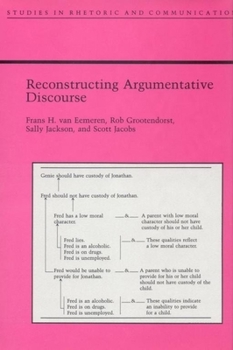Reconstructing Argumentative Discourse
(Part of the Studies in Rhetoric and Communication Series)
Select Format
Select Condition 
Book Overview
Reconstructing Argumentative Discourse analyzes argumentation in ordinary disputes. The analysis begins with an ideal model: a theoretical structure of discourse that might be used to resolve a dispute about the merits of two opposing cases. The ideal model does not describe actual argumentative practice. Argumentative discourse does not always seek genuine resolution and, when it does, the participants may not perform as ideal arguers.
A central challenge for argumentation theory is to give an account of argumentation occurring under less-than-ideal conditions and conducted by less-than-ideal participants. The authors offer detailed analysis of argument in such contexts as ordinary conversation, third party dispute mediation, and religious confrontation. An adequate analytic approach to such forms of discourse, the authors argue, must offer critical insight into actual practice; must begin with a defensible normative standard against which practice can be compared; and must also offer an applicable analytic machinery for making the comparison, so its methods can be tailored to empirical circumstances.The authors position their study of argumentation within a general "normative pragmatics" characterized by a dual commitment to usefulness and adequacy in description. A distinctive set of practical applications and a distinctive view of practicality follow from this approach, characterized not by the search for generalizable means-end relationships but by the development and testing of plans for making real argumentation look as much as possible like ideal argumentation.This book integrates for the first time the normative interest of dialectical theories of argumentation with the descriptive interests of the empirical study of everyday language use. This ambitious project is achieved by adopting a distinctively social and pragmatic view of argumentation--by seeing argumentation as a language activity structured for the function of resolving disagreements. The authors examine argumentation in a wide variety of contexts--including everyday conversation, campus evangelism, political speeches, newspaper letters to the editor, and the formal mediation of disputes. In doing so, they illustrate how to analyze the details of actual argumentation and tackle a variety of theoretical and methodological puzzles encountered in the effort to apply normative models to real life argumentation.Format:Paperback
Language:English
ISBN:0817312293
ISBN13:9780817312299
Release Date:June 2002
Publisher:University Alabama Press
Length:216 Pages
Weight:0.75 lbs.
Dimensions:0.7" x 6.0" x 9.2"
Customer Reviews
0 rating





